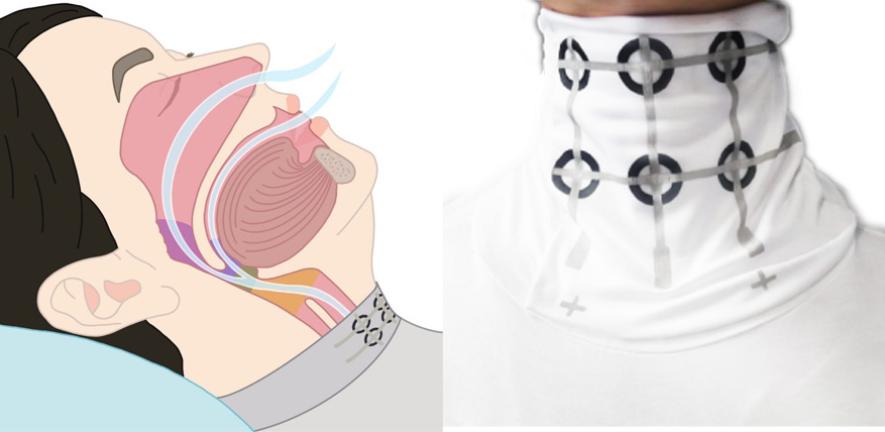Researchers develop ‘smart pyjamas’ to monitor sleep disorders

In a home setting
Researchers from the University of Cambridge have developed a revolutionary new approach to monitoring sleep disorders. This approach offers a comfortable and efficient alternative to traditional methods.
The innovative ‘smart pyjamas’ are designed to detect sleep disorders, such as sleep apnoea, in the comfort of your own home, eliminating the need for uncomfortable patches, bulky equipment, or visits to specialist sleep clinics.
Professor Luigi Occhipinti, who led the research, stated: “We need something comfortable and easy to use every night but accurate enough to provide meaningful information about sleep quality.”
The smart pyjamas are equipped with printed fabric sensors that can monitor a person’s breathing by detecting tiny movements in the skin, even when worn loosely around the neck and chest. This allows for seamless monitoring during sleep without the discomfort typically associated with traditional sleep monitoring devices.
The sensors embedded in the pyjamas were trained using a lightweight AI algorithm to identify six sleep states with 98.6% accuracy, including conditions like snoring and sleep apnoea.
Remarkably, the sensors can also distinguish between regular sleep movements, such as tossing and turning, and abnormal patterns indicative of sleep disorders. These energy-efficient sensors only require a few examples of sleep patterns to identify the difference between regular and disordered sleep successfully.
The research team believes their smart pyjamas could prove invaluable for the millions of people in the UK who struggle with sleep disorders. They offer a way to monitor their sleep habits and track how lifestyle changes may influence these. The findings were published in the Proceedings of the National Academy of Sciences (PNAS).
Sleep is crucial to human health, but over 60% of adults experience poor sleep quality, leading to productivity losses of between 44 and 54 working days annually. Inadequate sleep is also a significant contributor to a range of chronic conditions, such as cardiovascular disease, diabetes, and depression.
Sleep disorders like mouth breathing, snoring, and sleep apnoea are significant causes of sleep disruption, negatively impacting both physical and mental well-being.
“Poor sleep has huge effects on our physical and mental health, which is why proper sleep monitoring is vital,” said Professor Occhipinti. He went on to highlight the drawbacks of current sleep monitoring techniques. “The gold standard, polysomnography (PSG), is expensive, complicated, and unsuitable for long-term home use.”
While home sleep tests offer simpler alternatives to PSG, many focus on a single condition and are often bulky or uncomfortable. Wearable devices, such as smartwatches, offer convenience but can only make inferences about sleep quality and are ineffective for accurately monitoring disorders like sleep apnea.
The team built upon previous research, which included developing a smart choker for people with speech impairments, to create the new sleep-monitoring pyjamas. They re-designed graphene-based sensors for breath analysis during sleep, making several design improvements to increase sensitivity.
As a result, the sensors can detect different sleep states while ignoring regular movements, such as tossing and turning. Furthermore, they do not require the garment to be worn tightly around the neck, making it more comfortable for users.
The smart pyjamas use a machine learning model called SleepNet, which processes the signals from the sensors to identify various sleep states, including nasal breathing, mouth breathing, snoring, teeth grinding, central sleep apnoea (CSA), and obstructive sleep apnoea (OSA).
SleepNet’s lightweight AI design reduces computational complexity, allowing the system to run on portable devices without needing to connect to a computer or server. This makes it highly efficient and easy to use.
Tests conducted on healthy patients and those with sleep apnoea showed that smart pyjamas could detect a range of sleep states with impressive accuracy. The team also found that the sensors could withstand regular washing, thanks to a unique starching process. The smart pyjamas also feature wireless data transfer, allowing sleep data to be securely sent to smartphones or computers for further analysis.
“Sleep is so important to health, and reliable sleep monitoring can be key in preventative care,” said Occhipinti. The smart pyjamas could help users identify potential sleep issues, enabling them to seek professional advice before problems escalate. Notably, sleep behaviours like nasal versus mouth breathing may indicate underlying sleep disorders, which are not typically picked up in standard NHS sleep analyses.
The researchers plan to expand the use of these sensors to monitor various health conditions, including baby monitoring and have been in discussions with different patient groups. They are also working to improve the sensors’ durability for long-term use.
Image: The smart pyjamas use a machine-learning model called SleepNet, which processes the signals from the sensors to identify various sleep states. Credit: University of Cambridge













